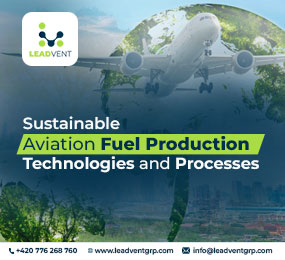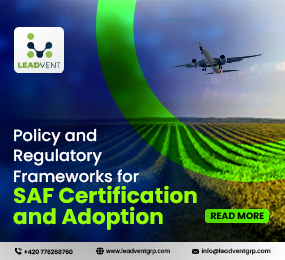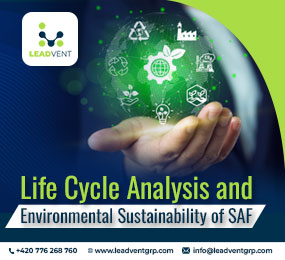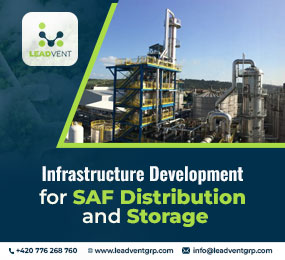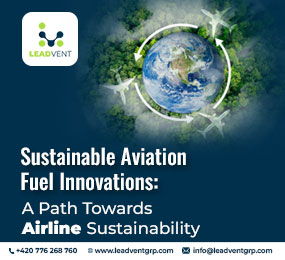The future of air travel, or aviation, needs to reduce its carbon footprint, and sustainable aviation fuel is a consequential way to help with this issue. This means creating the fuel is key to how widely it can be used and if it's good for the long run. These processes involve the aspects that define the sustainability of jet fuel, making them critical in the production of sustainable jet fuel.
This blog will cover the silent elements that would feedstock sourcing and also touch on the challenges of SAF supply chain management.
Exploring Feedstock Sourcing for SAF
Sourcing of feedstock lies at the core of SAF production, indicating that feedstock sustainability determines the environmental impacts and modularity of SAF production.
1. Diverse Feedstock Options
SAF production utilises a combination of feedstocks, comprising:
- Biomass-based materials: From agriculture and forestry, from algae and energy plants
- Waste-based materials: UCO, municipal solid wastes, and industrial residues
- Synthetic options: As for specific technologies, the reload basics refer to renewable energy-based solutions such as Power-to-Liquid (PtL) fuel.
2. Sustainability Considerations
Achievement of sustainable feedstock procurement is anchored on the reduction of impacts on the environment. Biomass not used for human consumption does not compete with food crops, while waste feedstocks decrease the use of landfill services. This exhibits the commitment towards no emissions of carbon.
Supply Chain Management: Challenges and Innovations
For the dependable SAF supply chain, there are several stages:
1. Feedstock Availability and Accessibility
Various feedstocks are available in different regions, which may result in problems in the supply chain. It is necessary, that international linkages need to be established so that consistent supplies can be made.
2. Infrastructure Development
To see the scale-up in the production of SAF, the associated transportation and processing facilities are required. Proposed decentralised processing plants closer to feedstock sources can decrease the price and emission points.
3. Policy and Financial Support
Using governmental support and incentives, i.e., subsidies and tax privileges, may help make SAF production comparable to fossil fuel mandates for blending, meaning that airlines pull more SAF demand through the supply chains.
Key Highlights of the World Sustainable Aviation Fuel Forum
These challenges can be resolved through the World Sustainable Aviation Fuel Forum or the aviation forum organised by Leadvent Group. The SAF Summit brings together industry experts, policymakers, and strategists to deliberate on measures that can strengthen SAFs' international developmental intentions.
Why This Forum Matters
- Innovative Insights: Attendees follow feedstock technologies and advanced and emerging methods of synthesis of SAF during the event.
- Global Collaboration: The forum within countries helps in fostering cooperation to have solutions for the supply chain worldwide.
- Real-World Success Stories: Presentations provide information about successful initiatives undertaken under SAF and are informative.
- Policy Advocacy: Included discussions related to the facilitation of regulation and incentives to strengthen governmental support for SAF supply chains.
Event Features
- The interaction with SAF pioneers and resources to meet other new NETs.
- Round tables on the sustainable future of aviation and policy perspectives.
- A collection of articles describing how SAF is approaching the challenges of IS innovation and implementing IS projects.
- To become a member and get more information, go to the World Sustainable Aviation Fuel Forum.
Case Studies: Pioneering SAF Projects
1. The SAF Hub Initiative of Singapore
Singapore has adopted highly developed infrastructural and waste management structures, which it has been able to develop an efficient and profitable SAF production structure through the utilisation of UCO and other waste feedstocks.
2. Synthetic SAF in Canada
Canada’s PtL projects show the best of synthetic fuel production. These schemes show the planting potential of SAF without the core biomass feedstocks, using renewable electricity and captured CO2.
Why You Should Attend the World Sustainable Aviation Fuel Forum
With SAF being an important topic in the aviation industry, this conference is crucial for everyone within the aviation Sustainable Aviation Fuel ecosystem.
What You’ll Gain
- Deep Industry Insights: Read more about the new trends of feedstock acquisition and supply chain solutions for SAF.
- Collaborative Solutions: A company should consult international specialists in emerging typical difficulties in scaling SAF.
- Networking Opportunities: Choose the audience to reach out to policymakers and leaders.
- Practical Takeaways: Being able to get actual knowledge through cases and discussions.
- For details and registration, please go to the World Sustainable Aviation Fuel Forum.
Frequently Asked Questions on SAF Feedstock and Supply Chain
Q1: What kind of feedstocks are used for SAF?
A1: SAF feedstocks comprise biomass, agricultural residues, waste such as UCO, and synthetic fuels generated from renewable energy.
Q2: How can supply chain influence the production of SAF?
A2: Logistics chains play a critical role in the sourcing, processing, and distribution of feedstocks, and the cost and availability of SAF are impacted.
Q3: Why is the World Sustainable Aviation Fuel Forum important?
A3: In particular, the forum provides stakeholders worldwide with ideas, partnerships, and strategies relevant to SAF’s supply chain and policy.
Conclusion
The decarbonisation of the aviation enterprise concerns the service of SAFs. The business needs to work on the feedstock sourcing and supply chain issues to ramp up its production.
Organised by the World Sustainable Aviation Fuel Forum, it is an unmatched opportunity for stakeholders to exchange knowledge, foster new cooperation, and discover new possibilities. This sustainable jet fuel message can be executed by attending and actively influencing this leading aviation forum of tomorrow today.


